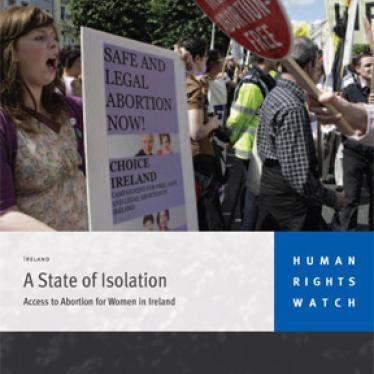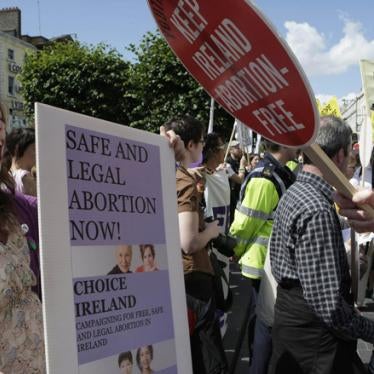(New York) - The European Court of Human Rights judgment on December 16, 2010, on Ireland's abortion restrictions is a wake-up call to the Irish government, Human Rights Watch said today. The case before the Strasbourg-based court, ABC vs. Ireland, was brought by three women who suffered grave health consequences as a result of not being able to access abortion services within Ireland. The court found that Ireland's failure to regulate access to abortion had led to a violation of its human rights obligations.
"In Ireland, even women, such as applicant C in this case, whose pregnancies are life-threatening are unable to access abortions," said Marianne Mollmann, women's rights advocacy director at Human Rights Watch. "This morning the European Court established that this is not just tragic, it is a violation of human rights. And it must end now."
In Ireland, abortion is legally restricted in almost all circumstances, with potential penalties of up to life in prison for both patients and service providers, except cases in which the pregnant woman's life is in danger. There is little legal and policy guidance on when, specifically, an abortion might be legally performed within Ireland. Every year thousands of women and girls travel from Ireland to other European countries for abortions.
In January 2010, Human Rights Watch released a report, "A State of Isolation: Access to Abortion for Women in Ireland," detailing how women struggle to overcome the financial, logistical, physical, and emotional burdens imposed by restrictive laws and policies that force them to seek care abroad, without support from the state. The case before the European Court was brought by three women who had personally suffered these ordeals.
"Unfortunately, the ABC case is only the tip of the iceberg," Mollmann said. "Every year, the Irish government prevents thousands of women and girls from getting timely access to medical care they need. This is true even in circumstances in which the Supreme Court of Ireland has said a woman is entitled to such access."
Overcoming the legal hurdles on access to abortion in Ireland for all women would ultimately require a constitutional amendment. However, the Irish government could take a number of actions immediately that would greatly improve women's lives, Human Rights Watch said. These include ensuring unfettered access to legal health services within Ireland, including life-saving abortions, post-abortion care, and screening for fetal abnormalities. These steps are also necessary to comply with the Court's judgment today.
The Irish government has been reluctant to engage in policy debates on abortion-related topics. The government's current financial problems and the resulting political fallout should not, however, keep the government from addressing the issue, Human Rights Watch said.
"The Irish government may feel under siege at the moment, but women in Ireland have been under siege for decades," Mollmann said. "It is time for the government to end their ostrich mentality regarding abortion and start delivering on women's human rights."








